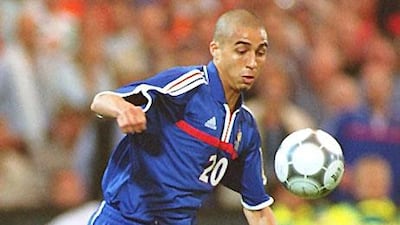As the 2011 summer transfer window closed last night, a quick audit through the major comings-and-goings stuck on a quartet of names: Ruud van Nistelrooy to Malaga; Samuel Eto'o to Anzhi Makhachkala; Diego Forlan to Inter Milan; David Trezeguet to Baniyas.
All strikers in their 30s, in search of the last lucrative contract of distinguished careers, and each accustomed to appearing, year in, year out on clubs' most-wanted lists.
Some might scoff at the idea of bracketing Trezeguet, the 33-year-old former France international, alongside a Dutchman who three times ended up as the leading scorer in a Champions League season, the Cameroonian who is three times a European club champion, and the Uruguayan who has twice, with different clubs, won the Golden Shoe for the best marksman in league football in Europe.
So let the statistics speak for Trezeguet.
His goalscoring record over the last 15 years in top-division football in France, Italy and Spain - we exclude a prolific season in Serie B with Juventus - is almost identical to Eto'o's: 187 goals in 331 matches for Trezeguet, 189 in 333 for the Cameroon captain.
At an average of more than a goal every game, a 55 per cent strike-rate, it is well ahead of Forlan, who is on 46 per cent over his nine and half years in Primera Liga, with Villarreal and Atletico Madrid, and the English Premier League, where he played for Manchester United.
For their national teams, Van Nistelrooy edges Trezeguet by the tiniest margin: The Frenchman hit 34 goals in 71 caps; the Dutchman has 35 strikes in 70.
What the statistics do not say is that Trezeguet spent his peak years in the hardest league in the world for strikers, as Serie A was for most of the Noughties. Eto'o played two years there, Forlan will sample Italy for the first time as of this month and Van Nistelrooy never has.
Yet, of the quartet, Trezeguet is certainly the least celebrated, and that is largely because of the nature of his game.
"Like most great finishers, David Trezeguet is a mystery," Marcel Desailly, the former France captain, said of him.
"He has a streak of the lone hunter, quite silent."
Arsene Wenger once chose a similar figure of speech. "He's a snake," declared the Arsenal manager, who knew Trezeguet from Monaco, where both had been employed.
It was meant as compliment: "He's a bit quiet and then he kills you with his finishing."
In essence, Trezeguet is the poacher par excellence, and in a game where the striking all-rounder, the forward who drops deep, runs into the wider channels, combines with the midfield and spends more and more of his productive time outside the penalty area, the poacher has become less fashionable.
Certainly, the defining, enduring partnerships of the Frenchman's career tended to cast him as Best Supporting Actor rather than feted superstar.
It was true when he played alongside Alessandro Del Piero, the darling of Juventus, where Trezeguet spent 10 years; it was true while France were claiming the status of the world's best national team with a devastating front line of the former Monaco colleagues, Thierry Henry and Trezeguet.
Henry made admirers swoon, but would say of his partner, who famously scored the decisive goal in the Euro 2000 final: "He always knows where the ball is going to end up, so it looks as though the ball is actually seeking him out. For a time, when we were playing together, I tried to discover his secret.
"I focused on where he was moving, and followed just behind him. If he went to the far post, I'd go far post. If he stuck to the near post, I'd be there. But the ball always ended up where I wasn't, and David would appear. The only other player I know with that knack is Pippo Inzaghi [of Milan]."
Like Inzaghi, Trezeguet has sometimes been lazily labelled as "lucky". "That's to take away the skill," Henry used to reply. "He has a gift."
That gift has been eroded by the passing of years.
Injuries have affected him more regularly, though on the evidence of last season, where he scored 12 La Liga goals in 30 matches for struggling Hercules, there is still dynamite in his powerful right foot.
Acceleration was never his most conspicuous asset, so the fading of speed that accompanies most athletes into their mid-thirties should be compensated by that uncanny sense he has of the geometry of the penalty area.
The question marks over his highly-paid move to the UAE, inevitably, surround his fitness and his competitive ambition. Born in France because his father, an Argentine footballer was playing there, Trezeguet grew up in Argentina.
He once told this reporter he had a "South American mentality". That meant a hunger, he explained: "Most people over there, in Argentina, don't grow up with three or four pairs of shoes. They only have one."


